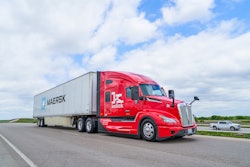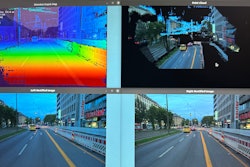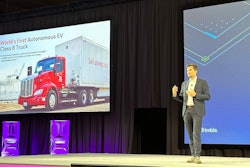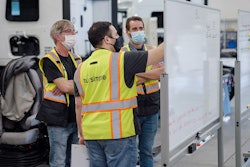Autonomous trucking is on its way. Congress is holding hearings to try to figure out how to frame future policy and regulations, and autonomous tech developers are continuing to develop, test and refine the technology.
In late September, after passing through California’s legislature, a bill that would have banned truly driverless trucks in the state was vetoed by Gov. Gavin Newsom, paving the way for further development of the technology in the state.
Joining us this week is Barrett Young, head of fleet safety at AI-powered fleet safety firm Netradyne, who talks about how AI and autonomous trucks will impact the trucking industry moving forward in California and the U.S. as a whole.
Contents of this video
00:00 10-44 intro
00:28 Autonomous trucking
03:54 Driver shortage
06:04 Will truck drivers lose jobs?
07:52 AI safety technology
10:24 Trucking jobs, regional and long haul
11:30 Autonomous truck and safety
Matt Cole:
This week's 10-44 is brought to you by Chevron Delo 600 ADF Ultra-low Ash Diesel Engine Oil. It's time to kick some ash.
Jason Cannon:
Our truck drivers and autonomous trucks can coexist as technology develops. You're watching CCJ's 10-44, a weekly episode that brings you the latest trucking industry news and updates from the editors of CCJ. Don't forget to subscribe and hit the bell for notifications so you'll never miss an installment of 10-44.
Hey, everybody. Welcome back. I'm Jason Cannon, and my co-host on the other side is Matt Cole. Autonomous trucking is on its way. Congress is holding hearings to try to figure out how to frame future policy and regulations. Autonomous tech developers are continuing to develop, test, and refine their technology.
Matt Cole:
In late September, after passing through California's legislature, a bill that would've banned truly driverless trucks in the state was vetoed by Governor Gavin Newsom, paving the way for further development of the technology in the state. Barrett Young, head of fleet safety at AI-powered fleet safety firm Netradyne, says if Newsom had gone along with lawmakers in the state and signed the bill into law, it could have negatively impacted highway safety in the long run.
Barrett Young:
Netradyne is the leading provider of artificial intelligence and data when it comes to advanced safety systems within the commercial vehicle industry. We have developed really some of the most sophisticated technology. We're considered a premium product at the top for those that really value safety within their fleet operations. The advancements in technology itself outweigh a lot of just the basic AI that you see across the board now. We lead that charge of being the one technology platform that challenges the status quo of how you actually improve fleet safety and driver performance.
True autonomous vehicles or true autonomous trucking is still several years away, where we're totally hands-off and vehicles are operating on their own. It's hard to say exactly what the impact would be. However, there are a lot of material benefits that come along with doing AB trucking well. As Netradyne... The reason why we wake up and come to work every day is to save lives. Simple as that. We have created very, very sophisticated technology that actually has tangible results in preventing accidents before they happen and ultimately saving more lives.
Autonomous trucking have very similar goals, in that, by removing human error, which is natural... We're humans. We shouldn't be ashamed of it. We make mistakes. But by removing human error, it reduces the chances of accidents happening at all. Now, of course, there's concern that... Is the technology advanced enough to recognize when to stop, when to slow down, when to turn, and things like that?
Sure, that's a continuing evolution of the technology itself. But one would argue, for those that actually work in autonomous companies, that the technology exists. It's there. It's being refined, of course. There's always edge cases that will need to work out. But it works. Once all of it's refined, and the edge cases are covered, and we've removed the human error element, then it comes down to the fact that we save more lives. We improve operations, and we save more lives on the road.
It's an interesting question because autonomous trucking, I think, is an inevitable future. I think it, with given objective mindsets, will benefit both the country and the industry in many different ways. Of course, there are people who side on it for different reasons on both sides. But in general, I think it's something that we need to consider and look at it from an objective viewpoint of the true benefits that it can bring.
Jason Cannon:
With the trucking industry facing a perpetual driver shortage, many in trucking believe autonomous trucking will help fill that gap down the road.
Barrett Young:
The ability to be able to move freight and cargo continuously, nonstop, obviously improves really the efficiency of the industry when it comes to getting cargo there on time or there faster, which is, ultimately, what everyone wants to do. Even going back to prove that one of the main reasons why the ELD mandate happened was because they want drivers to stop and take a break because they realized that drowsy driving was becoming a very big issue and leading cause of accidents. Forcing them or making it harder for them to cheat because they're trying to drive 24 hours straight was an issue. Now, autonomous vehicles would be able to accomplish that without having to take a break or two because they don't get tired.
Matt Cole:
Some trucking groups along with labor groups are on the opposite side of the equation, though, and believe autonomous trucking will result in a loss of truck driving jobs. After a word from 10-44 sponsor Chevron Lubricants, Barrett explains what he believes the outcome might actually be.
Jason Cannon:
Protecting your diesel engine and its after-treatment system has traditionally been a double-edged sword. The same engine oil that is so essential to protecting your engine's internal parts is also responsible for 90% of the ash that is clogging up your DPF and upping your fuel and maintenance costs.
Outdated industry thinking still sees a trade-off between engine and emission system protection. Chevron was tired of it. They spent a decade of R&D developing a no-compromise formulation. Chevron Lubricants developed a new ultra-low ash diesel engine oil that is specifically designed to combat DPF Ash clogging.
Delo 600 ADF with OMNIMAX technology cuts sulfate ash by a whopping 60%, which reduces the rate of DPF clogging and extends DPF service life by two and a half times. Just think what you can do with all the MPGs you're going to add from cutting your number of regions. But Delo 600 ADF isn't just about after treatment. It provides complete protection, extending drain intervals by preventing oil breakdown. Before, you had to choose between protecting your engine or your after-treatment system, and now you don't. 600 ADF from Delo with OMNIMAX technology. It's time to kick some ash.
Barrett Young:
What I think that the two different sides need to realize is understanding what changes may happen. Changes can always be perceived as positive or negative. But some of the changes will be the fact that long-haul truck drivers may be less needed. There's a chance that jobs there may reduced.
However, there also will be an increase in jobs for those that need to do the regional deliveries. Autonomous trucks are not going to stop at your house. It may have not even go directly to every single warehouse in a certain area. But instead, certain AV companies like, I think, Kodiak are doing with this hub-to-hub model, which is you drive from New York to LA. It stops at a hub in each one, just a point A to point B. Then, once it gets to one of those hubs, then there's a network that distributes or disseminates all of it to the multiple warehouses in that area or does a last-mile delivery of some sort.
Those jobs need to be created. It's really just a shifting and a change of where the jobs lives and who does them. Then, in that situation, for those truck drivers who miss their families because they're on the road all the time now get a chance to be home more often because they're not necessarily out on the other side of the country. Again, change is hard. There's no doubt about that. But it's a perceived change for... Is it going to be good or going to be bad? Because it just shifts on where things are actually happening.
In California, specifically... I think California is a very long state/very tall state, so being able to move cargo quickly and safely is obviously important, and just being able to establish jobs and new operations in different areas just means that we're continuing to grow as an economy in general.
Jason Cannon:
Barrett says that at Netradyne, the company's in-cab AI technology, which often goes hand in hand with autonomous technology, is used to both help correct poor driving behavior as well as reward good drivers.
Barrett Young:
We feel very, very strongly. We have a lot of proof already in the capabilities of our AI: that as the artificial intelligence continues to become more intelligent, then we'll be able to more proactively deliver on our mission, which is ultimately saving lives and reducing accidents, of course. We have very big, strong research and development teams that... All they do is continue to train and learn how to make the technology more effective. In fact, at this point, we've crossed one billion miles. But because of the number of vehicles that we're operating in, the number of minutes that is recorded, plus the number of miles, equates to close to 68,000 years in education, is how much the artificial intelligence has had to learn. Time and education together equals... It's more accurate, which is obviously most important.
Drivers, of course, are very hesitant to have dash cams, let alone artificial intelligent AI dash cams in their vehicles. But most importantly, they don't want to be blamed for doing something they actually didn't do wrong. Accuracy is very important. Netradyne touts... And we have proof to show that on our core alerts and signals, we have over 99% accuracy. It earns the trust of the drivers themselves. Netradyne specifically sits in a very unique position to be a technology that drivers actually can benefit from.
Basically, all of the other vendors or providers in the industry really can only recognize when a driver's done something wrong. Of course, the driver doesn't want in there because they're going to constantly get their hand slapped for doing something that they did wrong. But because Netradyne can actually analyze the entire driving day, as I mentioned, they can see all the good driving, then rewards and incentive programs, and if nothing else, a handshake for saying thank you for driving well... It goes a long way with the drivers. We aim to be not just the technology of choice for fleets but the technology of choice for drivers themselves because we truly are there to make their lives easier and safer, ultimately. AI is going to continue to get smarter, but that only just means that it gets better.
Matt Cole:
While certain trucking jobs may be less in demand in the future with autonomous technology, opportunities are expected to grow in other areas of the business.
Barrett Young:
There absolutely will be new styles of jobs that are created by this movement or this advancement or change into more autonomous trucking. Again, as I mentioned previously, maybe they go from long haul to regional. But drivers will still be needed. Then, maybe the autonomous takes up the remaining difference. We're actually not displacing jobs at all. We're just making up for the excess that we aren't able to transport the point this time because there is a driver shortage.
But let's say that there are drivers that are displaced. Then, yes, absolutely, there will be new versions of jobs. Now, if they want to go sit behind a desk or at a computer, that's up to them. I think a lot of drivers get into this job so they don't have to do that. But, again, there are going to be other ways that they can work with the industry and work with trucks that allows them to use their hands and their problem-solving skills that may not be behind a desk but still gives them purpose in life in it. Absolutely, there'll be more opportunity for them.
Jason Cannon:
When it comes to lawmakers and regulators developing a way for autonomous trucks to be safely integrated into the nation's fleet of vehicles. Barrett says it's important for safety to remain the ultimate goal.
Barrett Young:
As AV continues to evolve, I think it's also very, very important that we monitor its progression and its benefits to the economy and society based off of a true safety expert viewpoint versus a political viewpoint and, hopefully, as objectively as positive. Of course, there's two sides of the story. One wants one thing. One wants the other thing. Of course, they're going to do what's in their best interest, and they're going to do what's in their best interest. By having an objective source or expert that can say, "Here's what truly can happen, both good and bad, then we can make that decision of how we want to continue to do this. But it certainly should not be driven by politics.
Now, politics, of course, will be involved because regulations have to be developed. Those policies need to exist to help with all of that. I think where the industry can really benefit is that we have very strong leaders in this industry, with the ATA and other associations. It is their obligation to take the information that's being developed, turn it into an objective message, because, again, we want this to be a win across the board for everyone, and communicate it properly to everyone that they lead. I think it's up to other companies and vendors, even Netradyne, to continue to communicate both the pros and cons of how this will continue to affect the industry.
Again, my opinion, take it with a grain of salt, is that there are a lot of benefits that will happen over the coming years to improve efficiencies and improve safeties and things like that. It's up to us to really continue to properly educate so everyone understands both sides of the story. Then, they can formulate their own opinion.
Jason Cannon:
That's it for this week's 10-44. You can read more on CCJdigital.com. While you're there, sign up for our newsletter and stay up to date on the latest in trucking industry news and trends. If you have any questions or feedback, please let us know in the comments below. Don't forget to subscribe and hit the bell for notifications so you can catch us again next week.











